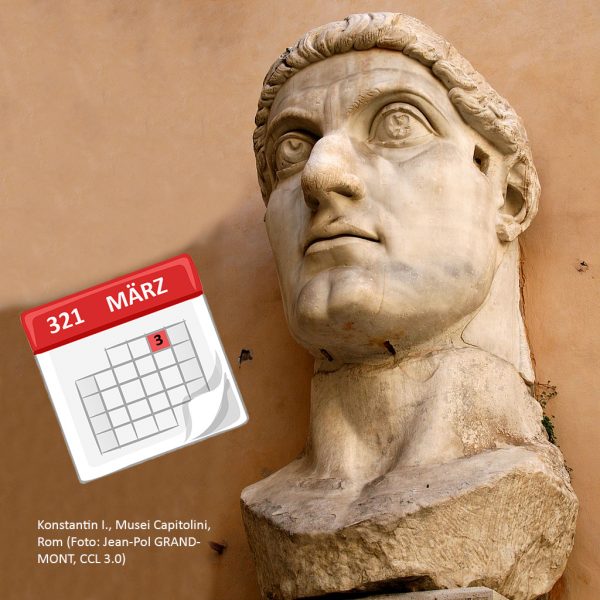 [nx_spacer size=”10″]Am 3. März 321, also vor genau 1700 Jahren, erklärte Kaiser Konstantin den Sonntag zum Ruhetag. Er ordnete an, dass „am Tag der Sonne [daher der Name Sonntag] alle Richter, ebenso das Volk in den Städten, sowie die Ausübung der Künste und Handwerke ruhen“ sollen.
[nx_spacer size=”10″]Am 3. März 321, also vor genau 1700 Jahren, erklärte Kaiser Konstantin den Sonntag zum Ruhetag. Er ordnete an, dass „am Tag der Sonne [daher der Name Sonntag] alle Richter, ebenso das Volk in den Städten, sowie die Ausübung der Künste und Handwerke ruhen“ sollen.
Hatten die ersten Christen den 7. Tag der Woche, also den biblischen Shabbat, als Ruhetag gemäß dem vierten der Zehn Gebote und nach dem Vorbild von Jesus gefeiert, so gelang es Konstantin mit seinem Gesetz ein doppelter Schachzug:
Einerseits wählte er einen dem Gott gewidmeten Tag, „der sich reichsweit durchgesetzt und mit dem Kaiserkult eng verbunden hatte: ,Sol invictus’, der unbesiegte Sonnengott“. Zugleich kam er „auch anderen entgegen, etwa dem geheimnisumwitterten Mithras-Kult, in dem die Sonne ebenfalls eine wichtige Rolle spielte“ (so der katholische Sender domradio.de, 7.2.2021).
Ich persönlich habe mich vor 60 Jahren entschieden, beim Sabbat der Bibel zu bleiben. Ich habe diesen Tag als eine erfrischende Oase in der Schul- und Studienzeit erlebt, auch später im Beruf und in der Familie. Selbst jetzt als Rentner freue ich mich mit meiner Frau die ganze Woche auf dieses Geschenk Gottes.
- Aufsatz 1700 Jahre Sonntagsgesetz. Was der römische Kaiser Konstantin damit beabsichtigte von Dr. theol. Johannes Hartlapp (PDF)
![]()
I chose the Sabbath
On March 3, 321, exactly 1700 years ago, Emperor Constantine declared Sunday a day of rest. He decreed that “on the day of the sun [hence the name Sunday] all judges, as well as the people in the cities, and the practice of arts and crafts should rest.”
Whereas the first Christians had celebrated the 7th day of the week, i.e. the biblical Shabbat, as a day of rest in accordance with the fourth of the Ten Commandments and following the example of Jesus, Constantine’s law was a double move:
On the one hand, he chose a day dedicated to God, “which had become established throughout the empire and was closely associated with the imperial cult. ‘Sol invictus,’ the unconquered sun god.” At the same time, it “also accommodated others, such as the mysterious cult of Mithras, in which the sun also played an important role” (according to the Catholic broadcaster domradio.de, 7.2.2021).
Personally, I decided 60 years ago to stay with the Sabbath of the Bible. I experienced this day as a refreshing oasis during my school and university years, and also later at work and with my family. Even now as a retiree, I look forward to this gift from God all week with my wife.
![]()
Me decidí por el sábado
El 3 de marzo de 321, hace exactamente 1700 años, el emperador Constantino declaró el domingo como día de descanso. Decretó que “en el día del sol [de ahí el nombre del domingo en inglés: Sunday, y en alemán: Sonntag] debían descansar todos los jueces, así como el pueblo en las ciudades, y la práctica de las artes y los oficios”.
Mientras que los primeros cristianos habían celebrado el séptimo día de la semana, es decir, el Shabbat bíblico, como día de descanso de acuerdo con el cuarto de los Diez Mandamientos y siguiendo el ejemplo de Jesús, Constantino logró una doble jugada con su ley:
Por un lado, eligió un día dedicado a Dios, “que se había consolidado en todo el imperio y estaba estrechamente asociado al culto imperial”. ‘Sol invictus’, el dios sol invicto”. Al mismo tiempo, “también daba cabida a otros, como el misterioso culto a Mitra, en el que el sol también desempeñaba un papel importante” (según la emisora católica domradio.de, 7.2.2021).
Personalmente, hace 60 años decidí mantenerme fiel al sábado de la Biblia. Este día lo viví como un oasis refrescante en mis años de escuela y universidad, y más tarde en mi profesión y en la familia. Incluso ahora, como jubilado, me alegro con mi esposa toda la semana a disfrutar de este regalo de Dios.

